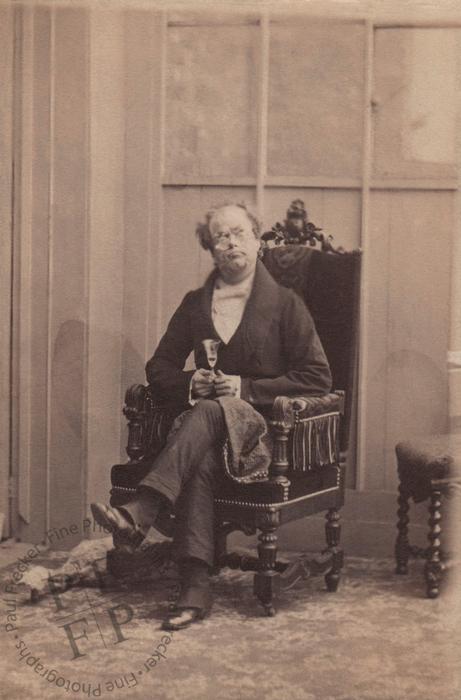Another pose from the same sitting
The comic actor James ('Jimmy') Rogers is seen here in The Goose with The Golden Eggs, by Augustus Mayhew and H. Sutherland Edwards, a one-act play first performed at the Royal Strand Theatre, London, in the first week of the September of 1859. The production ran until May of the following year.
‘STRAND — A farce of the most extravagant, ludicrous, mirth-provoking nature was produced at this theatre last night, under the title of The Goose with the Golden Eggs. It is from the pen of Mr Augustus Mayhew, and abounds in broad verbal jokes, flung about in reckless profusion, and in an immensity of practical fun. The plot is of course perfectly outrageous. Mr Turby, an attorney (Mr J. Rogers), has a daughter, Clara (Miss Ida Wilton), who is in love with his clerk, Bonser (Mr Mowbray). This audacity, joined with the fact that the clerk is far too honest, inspires the worthy attorney with the greatest disgust, and he dismisses the recreant scribe with ignominy. Shortly afterwards arrives a present of a goose for the young lady, which is found to be full flavoured, what is commonly termed “so high,” as to be utterly uneatable, and Turby determines to appropriate it in payment of a bet to a fellow-attorney, named Flickster (Mr Clarke), an old hand at chicanery, who aspires to be one of Clara’s suitors. Mr Flickster arrives, and the goose is handed to him; he is ineffably disgusted, and determines upon making it over to Bonser, to whom he owes some obligation; he departs with this intention, and immediately afterwards Turby discovers in the straw of the hamper a note announcing that Clara’s eccentric old aunt had celebrated her niece’s twenty-first birthday by sending her a goose, in which was stuffed a pocket-book containing five hundred pounds! Turby’s horror at his loss is humorous; he sends after Flickster, plies him with wine, and is altogether so polite in his behaviour, and so urgent to regain the goose, that Flickster (who has sent the bird off to Bonser) suspects it to be more valuable than he imagined, and the remainder of the piece is devoted to the struggles of the pair of knaves to regain the goose, which, when recovered finally, has no enclosure. It at length appears that the aunt feared the safety of the means of transmission, and encloses the money in a cheque to her niece, who marries Bonser, and the two attorneys, like Lord Ullin’s daughter, are “left lamenting.”
‘There is no attempt at point, or elaboration, but the little farce is full of most excellent “fun,” both of dialogue and situation, and, being very well acted, it was perfectly successful’ (Daily News, 2 September 1859).
Not every review was so positive. ‘If it be meritorious to bring before the public two bad specimens of humanity — two country lawyers — whose sole talent seems to be in their capability of bandying words, after the style of Billingsgate fishwomen, why then we have much pleasure in announcing that the author and the actors succeeded to perfection. […] Mr ROGERS worked very hard as “Mr Turby,” and Mr CLARKE was highly characteristic as “Mr Flickster,” but we must protest against the stage being made the vehicle for such unmitigated trash as this so-called farce is, from beginning to end. There is not a redeeming quality about it. […] The audience laughed but we do not think anyone would go to see it a second time’ (Daily Director and Entr’acte, 2 September 1859).

